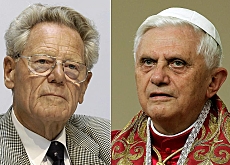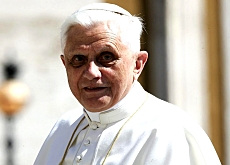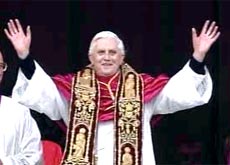Benedict keeps reformers waiting

Pope Benedict XVI marks the end of his first year in office on April 19, a year which began in pomp and celebration and has ended on a quieter note.
Catholic church observers in Switzerland expect more from the former Joseph Ratzinger in the coming year. But most are sceptical about the chances of wide-ranging reform.
Leading Swiss newspapers echoed the disappointment of those hoping for signs of change in the Church.
While the Neue Zürcher Zeitung referred to Benedict’s cautious start to his pontificate, Philippe Pfister writing in the SonntagsZeitung dismissed the pontiff as a mere “footnote” on the history books.
Negative comparisons have been made with Benedict’s predecessor, Pope John Paul II, a man of the people who loved to travel and meet his flock. Benedict is seen as being less charismatic and more bookish. In his first year, he has made just one trip outside Italy – to his homeland of Germany.
Style and substance
While it is clear that Benedict has a very different style to John Paul, Vatican observers tend to agree that he is following the same theological line as his predecessor and close friend – a disappointment to some within the Church.
“Most Catholics here in Western Europe probably hoped for reform, for example doing away with the celibacy rule for priests or admitting remarried divorcees to the sacraments. In this respect Benedict has certainly disappointed,” conceded Josef Bossart, head of the Catholic International Press Agency in Fribourg.
Swiss theologian Eva Südbeck-Baur, who leads an open church in Basel, told swissinfo that while the pope had chosen love for the subject of his first encyclical, he had treated it in a philosophical way.
“The most important questions about human rights in the Catholic Church, for example the rights of men and women to be ordained or the right to non-discrimination for same sex couples, are still to be addressed,” she said.
For Jean-Francois Mayer, a religious studies lecturer at Fribourg University, expectations of change from an arch-conservative were misplaced. “He wasn’t going to suddenly advocate women priests or a liberal policy towards homosexuals,” he told swissinfo.
Taking his time
Catholic affairs commentator Felix Corley thinks the pope’s low profile over his first year in office shouldn’t be seen as a sign of inability to act.
“I think he’s taking his time to see what issues he ought to be addressing,” he said.
But there were signs already of where Benedict’s priorities lay, he argued. Relations with Islam and moves towards healing the rift with a schismatic movement based in Switzerland were two of the main issues at a meeting the pope convened with his cardinals.
The sign of reconciliation towards Archbishop Lefebvre’s Society of Saint Pius X took many Vatican watchers by surprise, as did a meeting last autumn between the pope and dissident Swiss theologian Hans Küng, one of the Vatican’s fiercest critics.
Benedict’s apparent desire to reunify the Church was also evident in his approach towards the Orthodox churches, Mayer said. Healing the rift with the Orthodox communion would be a “fundamental commitment” of the papacy, the lecturer told swissinfo.
Observers agreed that the pope recognised the need to deal with the challenge of Islam, although inter-religious dialogue interested him less than dialogue with other Christian churches.
“Like many in the Christian churches, he’s frightened of the power of militant Islam and is going to be more assertive in pushing the rights of Christians living in Muslim countries,” Corley maintained. “And that is a new departure.”
swissinfo, Morven McLean
Pope Benedict has made moves towards normalising relations with the Switzerland-based Society of Saint Pius X, set up in 1969 to oppose the liberalising reforms of the Second Vatican Council.
Its founder, Archbishop Marcel Lefebvre, was excommunicated in 1988 after he consecrated four bishops without Rome’s consent.
Benedict has also reopened lines of communication with one of the most outspoken critics of the Vatican, Swiss liberal theologian Hans Küng.
Observers see these moves as an attempt to heal divisions within the Catholic Church.
Cardinal Joseph Ratzinger was elected pope on April 19, 2005.
He took the name Benedict XVI at his inauguration on April 24.
Benedict has made two trips outside the Vatican – to Catholic World Youth Day in Germany in August and a pastoral visit to Bari, Italy in May.

In compliance with the JTI standards
More: SWI swissinfo.ch certified by the Journalism Trust Initiative











You can find an overview of ongoing debates with our journalists here . Please join us!
If you want to start a conversation about a topic raised in this article or want to report factual errors, email us at english@swissinfo.ch.